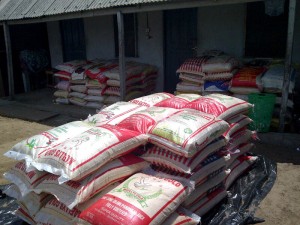Some Nigerians welcome proposed ban on rice importation
 A cross-section of Nigerians said on Wednesday that the proposed ban on rice importation in 2014 would augur well for the country.
A cross-section of Nigerians said on Wednesday that the proposed ban on rice importation in 2014 would augur well for the country.
The News Agency of Nigeria (NAN) recalls that the Federal Government had projected that the country would achieve food sufficiency by 2015 and as such plan to ban rice importation a year before that date.
The respondents said that the development would inspire and boost local rice production in the country.
Dr Andrew Efisue, the Assistant Rice Value Chain Team Leader under the Agricultural Transformation Agenda, told NAN that the country had not imported rice since January.
Efisue observed that rice importers had stopped bringing in the commodity due to the 30 per cent levy on imported rice, adding that the foreign variety found in the markets currently, were smuggled products.
He said that the country needed to stop rice importation to build its economy and value its local resources.
He noted that the country was spending so much on rice importation, which he said, was discouraging local farmers from cultivating rice on a commercial scale.
The assistant team leader pointed out that Nigeria had highly nutritive local rice, which origin could be trusted, compared to the rice being imported from other countries.
”Those ones we are importing have spent between 15 years and 20 years in the strategic reserve of those countries before they are exported to Nigeria.
”Our own (rice) as soon as we harvest, we consume. They are still fresh and more nutritious than all those. What we need to do is to encourage our local farmers to meet the standard of the consumers.
”Nigeria has been seen as a dumping ground; some of these countries export what they cannot consume to Nigeria.”
Efisue said the government would soon introduce mobile warehouses for the use of local rice producers, in order to enhance production.
Also commenting, Mrs Beatrice Saman, a rice importer, said that the price of the commodity had increased by about 30 per cent due to the expenses incurred by importers
Saman said even though the 30 per cent levy was too much, total eradication of imported rice may not be achieved.
In his remark, Mr Okoro Jos, a rice consumer, observed that the price of rice had skyrocketed in the market.
Jos expressed concern that when the ban becomes effective, many families may not be able to afford the commodity any more, as the local variety may not be enough to serve all Nigerians.
Jos, however, expressed optimism that if the Federal Government supported local farmers, Nigeria would be self-sufficient in rice production by 2015. (NAN)




